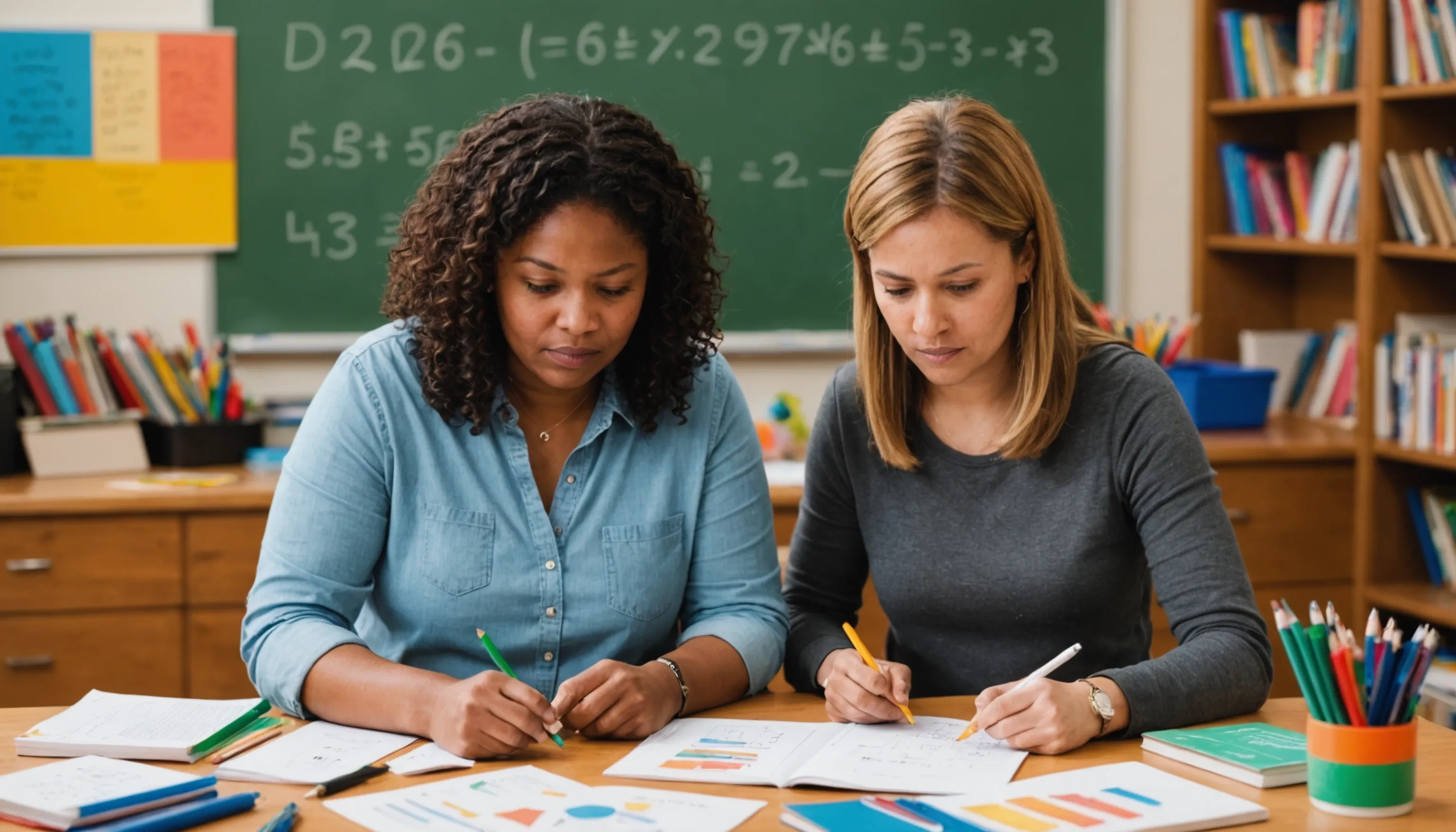Connect with Math: Engaging Strategies
 HvWHenry van Wagenberg
HvWHenry van Wagenberg
Connecting with Math: Strategies for Parents and Teachers
Connecting with math is crucial for parents & teachers aiming to enhance students' understanding and appreciation of the subject. One effective strategy is to incorporate math into everyday activities, such as cooking or shopping, where measurements & budgeting come into play. Additionally, fostering a positive attitude towards math can significantly impact a teenager's confidence. Encourage open discussions about math challenges & successes, making it a collaborative effort. Lastly, creating a supportive environment where mistakes are seen as part of the learning process can help teenagers feel more comfortable engaging with math concepts.
Understanding the Importance of Math in Daily Life
Understanding the importance of math in daily life is essential for teenagers as it lays the foundation for critical thinking & problem-solving skills. Math isn't just about numbers; it's a vital tool used in various aspects of everyday life. From budgeting finances to calculating distances, math plays a crucial role.
For instance, when teenagers engage in activities like shopping, they use math to compare prices and determine discounts. This practical application helps them develop essential skills for managing their finances. Moreover, math is integral in various professions, from engineering to healthcare, where precise calculations can impact outcomes.
Additionally, math enhances analytical skills. Teenagers often encounter situations that require logical reasoning and pattern recognition. Whether they're figuring out the fastest route to a destination or analyzing data for a school project, these skills are invaluable.
Moreover, understanding math fosters confidence. When students grasp mathematical concepts, they feel empowered to tackle complex problems. This confidence extends beyond academics, influencing their decision-making and critical thinking in real-life situations.
In summary, recognizing the importance of math in daily life is crucial for teenagers. It equips them with necessary skills, helps them make informed decisions, and prepares them for future challenges. Encouraging a positive attitude toward math will support their growth and development, ensuring they understand its relevance beyond the classroom.

Creative Ways to Make Math Fun at Home
Making math fun at home can significantly enhance teenagers' engagement with the subject. Here are some creative ways to achieve this:
- Math Games: Utilize board games or card games that incorporate math skills. Games like Monopoly or Uno require players to calculate scores, manage money, or strategize, making math enjoyable.
- Cooking Together: Involve teenagers in cooking or baking. This activity requires measuring ingredients and adjusting recipes, providing a practical application of math concepts such as fractions and ratios.
- Math Scavenger Hunts: Create a scavenger hunt where clues involve solving math problems. This encourages critical thinking & adds an element of adventure.
- Real-Life Math Challenges: Set up real-life challenges, like budgeting for a family outing. Involve teenagers in planning and calculating expenses, helping them understand the significance of math in decision-making.
- Incorporate Technology: Use educational apps and websites that offer interactive math games. Many platforms provide engaging content that turns learning into play.
By infusing creativity into math learning, parents can cultivate an environment where teenagers look forward to engaging with math. This approach not only boosts their skills but also instills a lasting appreciation for the subject. Remember, the key is to keep the experience enjoyable & relatable, connecting math to their interests and everyday activities.
Encouraging Teenagers to Engage with Math Concepts
Encouraging teenagers to engage with math concepts requires a supportive & interactive approach. Start by relating math to their interests, such as sports statistics or video game design, making the subject relevant. Use real-world applications to demonstrate how math impacts their daily lives. Foster a positive environment by celebrating small achievements, which builds confidence and reduces anxiety around math. Additionally, incorporate technology by introducing math-based apps or online resources that provide interactive learning experiences. Lastly, encourage open discussions about math challenges, creating a space where they feel comfortable asking questions & seeking help.

Using Technology to Enhance Math Learning
Using technology to enhance math learning is an effective way to engage teenagers in the subject. With the rise of digital tools, there are numerous resources available that cater to different learning styles. One popular method is incorporating educational apps that offer interactive math exercises. Apps like Khan Academy, Photomath, and Prodigy provide personalized learning experiences, allowing students to progress at their own pace while receiving immediate feedback.
Moreover, online platforms often include gamified elements, making math practice feel like a fun challenge rather than a chore. This approach helps to motivate students and encourages regular practice. For instance, students can earn rewards or compete with friends, fostering a sense of community and healthy competition.
Additionally, technology can facilitate collaborative learning. Tools like Google Classroom and Microsoft Teams enable students to work together on math projects, share resources, and discuss complex concepts in real-time, regardless of their physical location. This collaboration helps them learn from each other and develop critical thinking skills.
Video tutorials on platforms like YouTube also serve as valuable resources. Many educators create engaging content that breaks down complex concepts into digestible pieces. This visual approach helps reinforce learning & supports different levels of understanding.
In conclusion, integrating technology into math education can significantly enhance teenagers' learning experiences. By utilizing apps, online platforms, and video resources, parents & teachers can create a dynamic environment that fosters engagement and a deeper understanding of mathematical concepts.
Collaborative Math Activities for Parents and Teens
Collaborative math activities are an excellent way for parents and teenagers to bond while enhancing math skills. Engaging in these activities not only makes learning more enjoyable but also reinforces important mathematical concepts through teamwork. Here are some effective collaborative math activities to try at home:
- Math Board Games: Choose board games that require math skills, such as Monopoly or Life. These games encourage strategic thinking while practicing addition, subtraction, and money management.
- Cooking Challenges: Involve teenagers in meal preparation. Ask them to double or halve recipes, which requires understanding fractions, measurements, and proportions. This real-world application makes math relevant and fun.
- Math Puzzles and Riddles: Work together on math puzzles or brain teasers. Websites and books offer a variety of riddles that promote logical reasoning and problem-solving.
- Budgeting Projects: Plan a family outing or event together. Involve your teenager in budgeting for the trip, including transportation, food, and activities. This exercise teaches them how to manage money and apply math skills in practical situations.
- Outdoor Math Activities: Use outdoor activities to reinforce math concepts. For instance, create a scavenger hunt where clues involve solving math problems or measuring distances.
By engaging in these collaborative math activities, parents can create a positive learning environment that fosters teamwork and enhances their teenager’s confidence in math. These shared experiences not only strengthen their math skills but also deepen their relationship.
Resources for Supporting Math Education
Supporting math education at home is crucial for teenagers' academic success. Here are some valuable resources to consider:
- Online Learning Platforms: Websites like Khan Academy and IXL offer comprehensive lessons & practice exercises tailored to various skill levels.
- Math Apps: Apps such as Photomath and Prodigy provide interactive learning experiences, helping students grasp complex concepts through gamified learning.
- Books: Seek out math workbooks and reference books that cater to teenagers, offering practice problems and explanations.
- YouTube Channels: Channels like Numberphile and Math Antics present math concepts in engaging ways through videos.
Utilizing these resources can enhance understanding and foster a love for math.
Books and Online Resources for Math Skills
Books and online resources are essential tools for enhancing math skills among teenagers. They provide varied approaches to learning, catering to different learning styles and preferences. Here are some top recommendations:
- Books: Look for workbooks that focus on specific math skills, such as "The Art of Problem Solving" series, which challenges students with complex problems. Another excellent resource is "Algebra Unplugged" by Kenn Amdahl, which simplifies concepts in an engaging way.
- Online Courses: Platforms like Coursera and edX offer courses from universities that cover a range of math topics. These courses often include video lectures, quizzes, and peer discussions to reinforce learning.
- Khan Academy: This free online resource provides comprehensive lessons in various math subjects, complete with instructional videos and practice exercises. Students can learn at their own pace, making it ideal for reinforcing classroom learning.
- Math Websites: Websites like Mathway and Purplemath offer step-by-step solutions to math problems, helping students understand the processes involved. These sites also include forums where students can ask questions and receive guidance from peers and educators.
- YouTube Channels: Channels like Math Antics and 3Blue1Brown present math concepts visually, making them easier to understand. Their engaging content can spark interest and provide clarity on complex topics.
Utilizing these books and online resources can significantly enhance teenagers' math skills, boost their confidence, and foster a lasting appreciation for the subject.
Math Apps and Games for Teens
Math apps and games are excellent tools for engaging teenagers in learning while making the process enjoyable. These resources can help reinforce concepts, improve problem-solving skills, and foster a love for mathematics. Here are some highly recommended math apps and games for teens:
- Prodigy Math: This interactive game combines math practice with fantasy elements, allowing students to explore a virtual world while solving math problems. Prodigy adapts to each student's skill level, ensuring they are challenged appropriately.
- Photomath: This app allows students to take pictures of handwritten or printed math problems and receive step-by-step solutions. It's an excellent tool for understanding the processes behind problem-solving.
- Mathway: Similar to Photomath, Mathway helps students by providing instant answers to math problems. It covers a broad range of topics, from basic arithmetic to calculus, making it a versatile resource.
- Khan Academy: The Khan Academy app offers a wealth of video lessons and practice exercises on various math topics. Students can track their progress and receive personalized recommendations based on their performance.
- Math Bingo: This fun game combines traditional bingo with math practice. Players answer math questions to mark their cards, making it a lively way to reinforce skills with family or friends.
Incorporating these math apps and games into daily routines can make learning math more appealing and effective for teenagers. By blending education with entertainment, students can develop a positive attitude towards math and improve their skills simultaneously.
